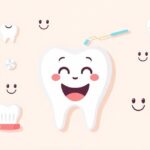Are you a woman over 40 wondering how to keep your oral health shining bright? Many women face unique challenges with their dental health as they age, including issues like gum sensitivity and dry mouth. You might feel frustrated, but you’re not alone! Discovering the best vitamins for oral health can be a game-changer for you. In this article, we will delve into the essential nutrients that can help rejuvenate your smile and give you back your confidence.
Understanding the Connection Between Diet and Oral Health
Diet plays a vital role in maintaining oral health, especially for women over 40. As we age, our bodies change, and so do our nutritional needs. Foods rich in essential vitamins and minerals directly affect our oral health. For instance, calcium and vitamin D are known to strengthen our teeth and bones. It’s important to include a variety of nutrients in your diet to keep your oral health in check.
Why Oral Health Matters More as We Age
As women age, the risk of oral health issues increases. Hormonal changes, especially during menopause, can lead to gum disease and dry mouth, making it more crucial to prioritize oral care. Women may experience shrunken jawbones, leading to loose teeth and discomfort. Maintaining good oral health can also prevent other health complications, such as heart disease, diabetes, and respiratory issues.
Essential Vitamins That Boost Oral Health
Here are some essential vitamins that can boost oral health:
- Vitamin A: Essential for maintaining healthy mucous membranes in the mouth.
- Vitamin C: Important for gum health and healing.
- Vitamin D: Aids in calcium absorption for strong teeth.
- Vitamin K: Helps in blood clotting, supporting healthy gums.
Top Nutrients for Strong Teeth and Gums
In addition to vitamins, certain nutrients are crucial for strong teeth and gums:
- Calcium: Supports structural integrity and is necessary for maintaining healthy teeth.
- Phosphorus: Works alongside calcium to strengthen tooth enamel.
- Omega-3 Fatty Acids: Reduce inflammation and promote gum health.
- Fiber: Helps to clean teeth and gums naturally while improving saliva flow.
How Calcium and Vitamin D Protect Your Smile
Calcium is often referred to as the building block of bones and teeth. It helps to maintain the structure of your teeth. Vitamin D is essential for calcium absorption, so they work hand-in-hand. Women over 40 should ensure they are getting enough calcium and vitamin D through their diet or supplements. Incorporating dairy products, leafy greens, and fish can provide a significant boost.
The Role of Vitamin C in Gum Maintenance
Vitamin C is a superstar when it comes to gum health. It helps to prevent gum disease by keeping the soft tissues in your mouth healthy. Low levels of vitamin C can lead to bleeding gums and potential tooth loss. Citrus fruits, berries, and leafy vegetables are excellent sources of this vital vitamin. Incorporate these into your daily meals to support your gum health.
Omega-3 Fatty Acids for Reducing Inflammation
Omega-3 fatty acids are known for their anti-inflammatory properties. These nutrients can help reduce inflammation in the gums, which is particularly beneficial as we age. Foods like salmon, walnuts, and flaxseeds are great sources of omega-3s. Including these in your diet can support overall oral health and combat issues like periodontal disease.
Importance of Hydration for Oral Health
Staying hydrated is essential for maintaining saliva production, which protects your teeth from decay. As we age, dry mouth can become a common issue, leading to an increased risk of cavities and gum disease. Drinking plenty of water throughout the day helps to wash away food particles and bacteria, promoting better oral health. Aim for at least eight glasses of water daily to keep your mouth healthy and hydrated.
Daily Habits to Complement Your Vitamin Intake
Beyond taking vitamins, establishing daily habits can enhance your oral health:
- Brush twice a day: Using fluoride toothpaste helps prevent decay.
- Floss daily: Flossing removes food between teeth that a toothbrush can’t reach.
- Regular dental check-ups: Visit your dentist every six months to catch any issues early.
- Avoid tobacco: Quit smoking to reduce the risk of gum disease and oral cancer.
Taking Action: A Simple Routine for Your Oral Health
Implementing a simple but effective routine can greatly improve your oral health. Start by assessing your diet and adding foods rich in essential vitamins. Ensure your daily habits include consistent brushing, flossing, and hydration. Consider supplemental vitamins if you’re not getting enough from food alone. Remember, it’s never too late to take control of your oral health. Commit to a healthier lifestyle today, and let each small step empower you towards better well-being.






